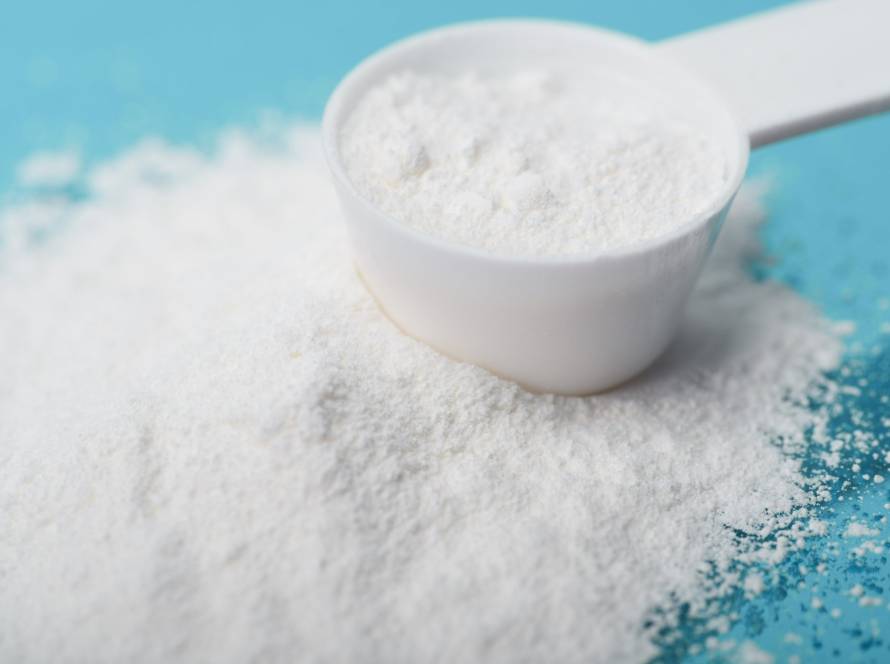New studies highlight how vitamin K2 plays a vital part in turning on proteins. These proteins help move calcium into our bones and keep it from building up in our arteries.
This piece takes us through what does vitamin K2 do for your body. We’ll look for its basic job in calcium metabolism and its newly discovered benefits for brain health. We’ll get into the science behind different forms of K2 and find practical ways to get more K2 from food and supplements to support our health and live longer.
How does vitamin K2 support our health?
Vitamin K2 helps regulate how our body uses calcium, directing it into bones and teeth where it’s needed and keeping it out of soft tissues like arteries. It activates important proteins such as osteocalcin, which supports bone mineralization and matrix gla-protein (mgp), which helps prevent calcium buildup in the blood vessels.
By doing so, vitamin k2 plays a critical role in maintaining strong bones and a healthy cardiovascular system. It may also support dental health and cellular function, making it an important nutrient for long term wellness and healthy aging.
Understanding vitamin K2 and its essential functions
Vitamin K2’s story began with experiments on sterol metabolism in the late 1920s. Scientists spent decades learning about its complex biological roles that go beyond blood clotting. This nutrient is now known to be crucial for calcium metabolism, bone formation and heart health.
The discovery and history of vitamin K2
The vitamin K story started in 1935 when the scientist Henrik Dam tested chickens on a cholesterol-free diet. Dam’s chickens had frequent bleeding episodes that adding cholesterol back couldn’t fix. He found an unknown compound in hemp seeds that stopped the bleeding and named it vitamin K after the German word “koagulation”.
The 1970s brought a breakthrough in vitamin K research. Scientists found γ-carboxyglutamic acid (Gla), a modified amino acid in all vitamin K-dependent proteins. This discovery gave an explanation of vitamin Ks function and led to finding many more vitamin K-dependent proteins beyond blood clotting.
How K2 works in the body
K2 acts as a cofactor for the enzyme γ-glutamyl carboxylase. This enzyme changes specific proteins after they’re made. K2 helps convert glutamate residues (Glu) to γ-carboxyglutamate residues (Gla) in vitamin K-dependent proteins. These proteins can then bind calcium ions, a feature they need to work properly.
K2 works through a cycle called the vitamin K cycle. The enzyme vitamin K epoxide reductase (VKOR) first reduces K2 to vitamin K hydroquinone (KH2). The reduced form then helps carboxylate glutamate residues while becoming vitamin K epoxide (KO). VKOR converts the epoxide back to K2, completing the cycle.
The core vitamin K-dependent proteins include osteocalcin and matrix Gla protein (MGP). Osteocalcin binds calcium to bone matrix. MGP stops calcium from building up in soft tissues like arteries. K2 will give a proper calcium balance by activating these proteins. It directs calcium to bones where it belongs and keeps it away from arteries where it causes damage. This two way action explains K2’s benefits for bone strength and heart health.
New research shows K2 also affects energy metabolism, brain function and cell processes tied to longevity. K2 influences cell growth, survival and signaling throughout the body by activating proteins like Gas6.
The vital role of K2 in calcium metabolism
The calcium paradox is a vital health phenomenon. Higher calcium intake makes bones stronger. Yet it also increases cardiovascular disease risk through arterial calcification. This contradiction comes from how our bodies process calcium.
Understanding the calcium paradox
Matrix GLA protein (MGP) plays a key role in preventing calcification. Vascular smooth muscles produce this vitamin K-dependent protein that controls calcium buildup. Without enough vitamin K2, MGP stays inactive. This leads to poor calcium removal from blood vessels and higher heart disease risk. Many populations consume plenty of calcium but still face high rates of osteoporosis and cardiovascular disease. Taking at least 32 mcg of vitamin K2 each day will give a lower risk of blood vessel calcification and better vessel elasticity, according to studies.
Synergistic relationship with vitamin D
Vitamin D helps absorb calcium and phosphorus from the intestines. K2 then guides this calcium to the right tissues. Together they ensure calcium builds up in bones instead of arteries. Studies show vitamin D boosts the production of vitamin K-dependent proteins in animals and lab tests. Vitamin D also helps bone formation by stimulating osteoblast specific genes when working with vitamin K.
Clinical trials have found better results in postmenopausal women’s bone density when they take both vitamins D and K. Taking these nutrients together works better than using either one alone. This combination helps build stronger bones and protects heart health.
K2 benefits for cardiovascular health
Vitamin K2’s cardiovascular benefits stem from its ability to activate Matrix Gla protein, which regulates calcium balance in blood vessels. This protein serves as the life blood of the entire process.
Preventing arterial calcification
Studies show that vitamin K2 activates Matrix Gla protein (MGP), which experts call the strongest inhibitor of vascular calcification. Active, carboxylated MGP stops calcium from building up in arterial walls and fights against calcification promoting proteins like bone morphogenic protein-2 (BMP-2). MGP needs vitamin K2 to become active and work properly. Blood levels of inactive MGP rise when K2 levels are low, which points to a higher risk of vascular calcification. Research has shown strong links between low vitamin K levels and widespread calcification across different patient groups.
Effect on heart disease risk
The largest longitudinal study reveals K2’s impressive heart protective benefits. People who consumed the most vitamin K2 had a 14% lower risk of atherosclerotic cardiovascular disease hospitalizations compared to those who consumed the least. The same research found that higher K2 intake reduced the risk of ischemic heart disease by 14%, stroke by 13% and peripheral arterial disease by 12%.
Research shows a strong link between higher blood levels of dp-ucMGP (which suggests low vitamin K status) and increased death risk from all causes. Mendelian randomization studies have proven that genetically predicted lower dp-ucMGP levels relate to reduced cardiovascular risk and death rates.
Clinical evidence on vascular elasticity
Clinical trials offer solid proof of K2’s effect on arterial elasticity. A three year study with 244 healthy postmenopausal women showed that daily supplements of 180 μg vitamin K2 (as MK-7) substantially improved carotid femoral pulse wave velocity, the best measure of arterial stiffness.
A one year follow up study looked at people with high cardiovascular risk due to vitamin K deficiency. The results showed that taking MK-7 supplements (180 μg daily) led to meaningful drops in both dp-ucMGP and carotid femoral pulse wave velocity. The K2 group managed to keep their arteries flexible throughout the study, while the placebo group’s arteries became stiffer.
K2 benefits for bone and dental health
Osteocalcin activation is the main way vitamin K2 affects skeletal structure. This bone-specific protein needs vitamin K2-dependent carboxylation to bind with hydroxyapatite crystals in bone tissue.
Activating osteocalcin for bone mineralization
Vitamin K2 acts as a vital cofactor in bone metabolism that activates osteocalcin through gamma-carboxylation. Without activation, undercarboxylated osteocalcin (ucOC) can’t bind to hydroxyapatite or aid calcium deposition in bones. Lab studies show vitamin K2 boosts osteoblast function and stimulates alkaline phosphatase and insulin like growth factors that build bone. K2 creates two effects, it aids mineralization and prevents calcium buildup in soft tissues.
Studies show vitamin K2 moves the balance toward bone formation through several ways. It reduces osteoclastogenesis, triggers osteoclast apoptosis and lowers RANKL expression. These actions help proper bone mineralization and maintain bone strength.
Reducing fracture risk in osteoporosis
Clinical evidence supports vitamin K2’s ability to prevent fractures. A meta analysis revealed vitamin K2 supplements substantially reduced fracture occurrence compared to control groups (RR = 0.38, 95% CI 0.20 to 0.76). People with existing bone disorders showed the strongest benefits. Japanese patients using menaquinone-4 experienced an impressive 80% reduction in hip fractures.
Supporting dental remineralization
Vitamin K2 plays a significant role in dental health. It activates matrix-GLA protein in teeth and directs calcium into dental structures. This protein’s involvement helps build stronger teeth and might reverse cavities.
Odontoblasts are specialized dental cells that fight tooth decay and need vitamin K2 to work properly. These cells make antimicrobial proteins and release osteocalcin to defend against and heal dental caries. Teeth may not place minerals correctly without enough vitamin K2, which makes them decay faster.
Clinical studies found that people with periodontitis had much lower vitamin K2 levels than healthy individuals. Vitamin K2 levels showed negative associations with clinical signs like bleeding gums and attachment loss, which shows its importance for periodontal health.
Emerging research on K2 and neurological function
Scientific research has found that vitamin K2 plays a promising role in brain health. This goes way beyond its known benefits for bone and cardiovascular systems. New studies link this nutrient to protecting nerve cells through several biological pathways.
Potential benefits for Alzheimer’s disease
Vitamin K2 shows great promise in preventing Alzheimer’s disease (AD) through multiple ways. Research links higher brain levels of menaquinone-4 (MK-4) to 17% to 20% lower odds of dementia or mild cognitive impairment. These patients also showed 14% to 16% lower odds of advanced Braak stages, a measurement of AD progression. Lab studies have shown vitamin K2’s remarkable power to protect neurons from death caused by beta amyloid exposure.
Vitamin K2 helps curb neuroinflammation, a vital factor in AD development. Research shows MK-4 suppresses microglial inflammation by blocking NF-κB signaling. This reduces inflammatory cytokines. K2 also substantially reduces GSK3α/β expression and total tau protein levels, which tackles another key aspect of Alzheimer’s pathology.
K2’s role in Parkinson’s disease
Scientists first found the link between vitamin K2 and Parkinson’s disease (PD) through innovative research on fruit flies. These flies had PINK1 mutations similar to PD patients. Research showed that vitamin K2 fixed energy production in damaged mitochondria, which helped the insects fly better. These findings led researchers to start clinical trials about K2’s potential benefits for PD patients with mitochondrial problems.
K2 regulates mitochondrial membrane potential and reduces oxidative stress, which protects nerve cells from damage. A study with 93 PD patients found their K2 blood levels were substantially lower than healthy people. This suggests a possible connection between low K2 and disease progression.
Impact on cognitive function and brain health
K2 supports brain function through several pathways. It activates vitamin K-dependent proteins Gas6 and protein S, which help cells survive, move and form myelin. K2 also plays a vital role in making sphingolipids, key parts of brain cell membranes that affect cognitive function.
Clinical evidence backs up K2’s benefits for cognition. Six studies showed a clear link between low vitamin K intake or blood levels and worse cognitive performance in adults over 65. When older rats received K2 supplements, their memory improved substantially. The supplements reduced brain oxidative stress and preserved frontal cortex and hippocampal tyrosine hydroxylase, essential elements for maintaining cognitive function.
Scientists have discovered K2’s exciting brain benefits, that suggest K2 might protect against neurodegenerative conditions, which makes it crucial throughout our life.
We should include K2-rich foods or supplements in our diet, especially when we have vitamin D. Science proves that this combination supports our long term health and longevity. The research makes it clear, vitamin K2 is a complete health optimizer.


